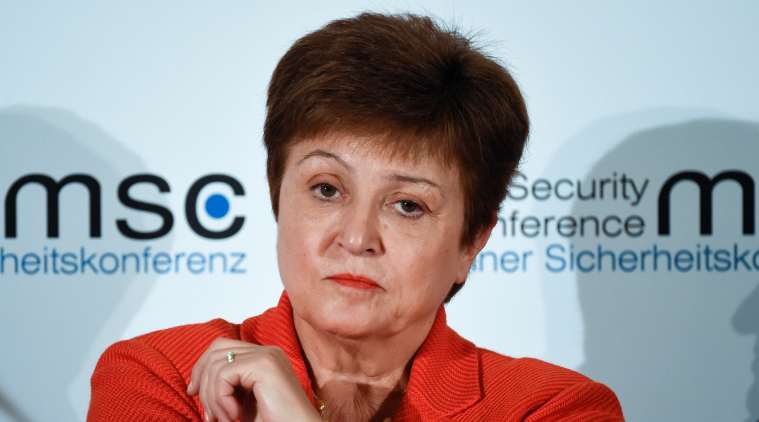2020 could see worst global economic fallout since Great Depression: IMF
Following the outbreak of the COVID-19 pandemic, which has claimed thousands of lives around the world, International Monetary Fund (IMF) Managing Director Kristalina Georgieva Thursday said that due to the pandemic, the year 2020 could see the worst global economic fallout since the Great Depression in the 1930s with over 170 countries likely to experience negative per capita income growth.
The remarks were made by Georgieva during the Managing Director’s address on Confronting the Crisis: Priorities for the Global Economy at Washington ahead of the annual Spring meeting of the International Monetary Fund (IMF) and the World Bank the following week.
“Today, the world is confronted with a crisis like no other. COVID-19 has disrupted our social and economic order at lightning speed and on a scale that we have not seen in living memory,” she said. Georgieva added that the virus is causing a tragic loss of life while the lockdown has affected the lives of billions of people. “What was normal just a few weeks ago, going to school, going to work, being with family and friends is now a huge risk”, she said.
With the world facing uncertainty over the depth and duration of the crisis, the managing director said that it is clear that global growth will take a negative plunge this year. “In fact, we anticipate the worst economic fallout since the Great Depression”, said Georgieva.
 Pedestrians walk along a near-empty Orchard Road in Singapore on Tuesday, March 24, 2020. Singapore will deliver a supplementary budget and bring forward its monetary policy decision as authorities ramp up support for an economy heading toward recession.
Pedestrians walk along a near-empty Orchard Road in Singapore on Tuesday, March 24, 2020. Singapore will deliver a supplementary budget and bring forward its monetary policy decision as authorities ramp up support for an economy heading toward recession.
“Just three months ago, we expected positive per capita income growth in over 160 of our member countries in 2020. Today, that number has been turned on its head: we now project that over 170 countries will experience negative per capita income growth this year”, she said.
The Great Depression, one of the worst economic downturns in the world began in 1929 in the USA after the New York Exchange on Wall Street crashed, wiping out millions of investors. The Great Depression had lasted for 10 years before the economy made a recovery.
Georgieva said that the global economy has been hit substantially owing to the containment measures which have been put in place to slow the spread of COVID-19. “This is especially true for retail, hospitality, transport, and tourism. In most countries, the majority of workers are either self-employed or employed by small and medium-sized enterprises. These businesses and workers are especially exposed”, she added.
 FILE – In this Feb. 14, 2020 file photo, Kristalina Georgieva, Managing Director of the International Monetary Fund, attends a session on the first day of the Munich Security Conference in Munich, Germany. Georgieva said Friday, March 27, it is clear that the global economy has now entered a recession that could be as bad or worse than the 2009 downturn. (AP Photo/Jens Meyer, File)
FILE – In this Feb. 14, 2020 file photo, Kristalina Georgieva, Managing Director of the International Monetary Fund, attends a session on the first day of the Munich Security Conference in Munich, Germany. Georgieva said Friday, March 27, it is clear that the global economy has now entered a recession that could be as bad or worse than the 2009 downturn. (AP Photo/Jens Meyer, File)
Observing that emerging markets and low-income nations in Africa, Latin America and Asia are at high risk, the IMF chief said that with weaker health systems to begin with, many face the dreadful challenge of fighting the virus in densely populated cities and poverty-stricken slums, where social distancing is hardly an option.
“With fewer resources to begin with, they are dangerously exposed to the ongoing demand and supply shocks, drastic tightening in financial conditions, and some may face an unsustainable debt burden”, she remarked.
Georgieva said that the IMF has estimated that trillions of dollar will be required for financing the the gross external needs of emerging markets and developing countries. While the IMF can cover a portion of the amount, the residual amount leaves gaps amounting to billions of dollars. “They urgently need help”, she said.
Speaking on a positive note, the managing director remarked on the coordination between countries as governments around the world have taken action on a war footing to contain the spread of the pandemic. “Countries around the world have taken fiscal actions amounting to about $8 trillion (USD). In addition, there have been massive monetary measures from the G20 and others”, she said.
The IMF chief stressed upon the importance of continuing with containment measures, supporting healthcare systems, shielding those who have been affected by the lockdown and helping companies with large, well-timed fiscal and financial measures to reduce the stress on the financial system.
“Even as we move through this containment phase, we must plan for recovery”, she said.
